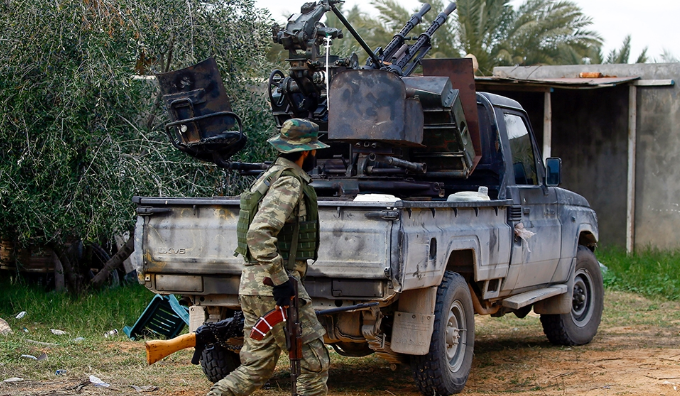Libya rivals, world powers set to meet in Berlin

Libya’s warring sides and representatives of foreign powers are arriving in Berlin for a highly-anticipated summit to discuss ways to end the long-running conflict in the North African country.
The head of Tripoli’s internationally-recognised government, Fayez al-Sarraj, and his rival, renegade military commander Khalifa Haftar, are expected to attend Sunday’s United Nations-backed gathering in the German capital, the first such event since 2018.
The presidents of Russia, Turkey and France are due for talks from around 2pm (13:00 GMT). The one-day summit will also include United States Secretary of States Mike Pompeo and leaders from European and Middle Eastern countries.
Sunday’s Berlin summit is the latest attempt to restore stability and peace to Libya, which has been splintered between competing factions and militias since former leader Muammar Gaddafi was overthrown and killed during a NATO-supported uprising in 2011. The deeply divided country currently has two rival administrations: The Tripoli-based Government of National Accord (GNA).and another allied with Haftar in the eastern city of Tobruk.
As with previous failed attempts, Haftar, who in April last year launched an offensive to take Tripoli, will be centre stage and international powers hope to put pressure on him to continue a ceasefire brokered by Russia and Turkey that has largely held for one week.
The warring sides earlier this month agreed to the ceasefire, though Haftar dramatically departed talks in Moscow on January 12 before signing the formalised agreement with al-Sarraj.
Eastern-based forces loyal to Haftar escalated the conflict on Friday when allied tribesmen shut down eastern oil ports, cutting oil production by 800,000 barrels a day, and crippling Tripoli’s main source of income.
Germany to host meeting aimed at ending Libya war, The move was a protest against Turkey’s decision to send troops to shore up the GNA.
Haftar is backed by the United Arab Emirates (UAE), Egypt, Jordan, Sudanese and Chadian fighters, and most recently Russian mercenaries. France has also been accused of giving him some support.
Underlining the stakes involved, German Foreign Minister Heiko Maas said “Europe and those players who are influential” in the region have all been called to Berlin, because “we have to make sure Libya doesn’t become a second Syria.”
“The conference can be the first step to peace for Libya,” Maas told the Bild newspaper.
A fighter loyal to the internationally recognised Libyan Government of National Accord (GNA) walks past a vehicle in an area south of the Libyan capital Tripoli on January 12, 2020. Both sides in Libya
The UN hopes all sides will sign up to a plan to refrain from interference, and commit to a truce that leads to a lasting end to hostilities, according to a draft of a final communique seen by AFP news agency.
That document also urges all parties to re-commit to a much-violated UN arms embargo and raises the prospect of political, inter-Libyan talks in Geneva at the end of the month.
If all goes to plan, the Berlin participants will hold an evening press conference.
“What will be signed up to in Berlin has already been agreed upon, including the embargo, the principles of a ceasefire and what the peace process that follows it must entail,” Tarek Megerisi, policy fellow at the European Council on Foreign Relations, told Al Jazeera.
“It will be kind of a general freeze-frame of current countries, what level of influence they have and [what] they’ve been able to impart on the communique that will be signed up to.
“But if previous agreements are anything to go by, I don’t think anybody’s really intending to stick to what they agree to in Berlin.”
On the eve of the talks, Turkish President Recep Tayyip Erdogan warned Europe to stand united behind al-Sarraj’s government, as Tripoli’s fall could leave “fertile ground” for groups ISIL or al-Qaeda “to get back on their feet”.
The International Crisis Group’s Libya expert Claudia Gazzini said the Berlin conference “could be a modest step forward” on the path to peace.
“Yet the risk remains that some participants will merely pay lip service to the diplomatic initiative, even as they continue to fuel a war from which they benefit.”
Source: Al-Jazira